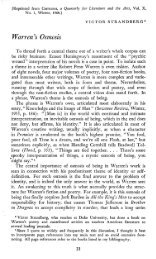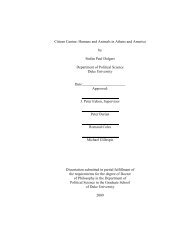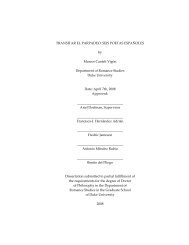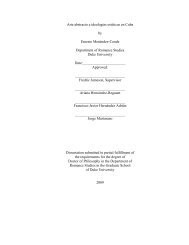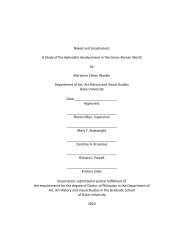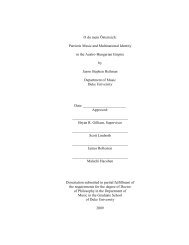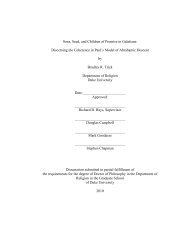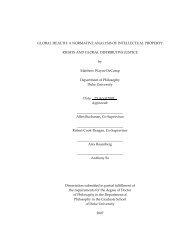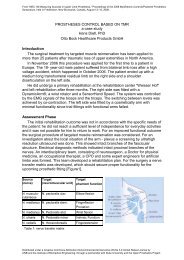View/Open - DukeSpace - Duke University
View/Open - DukeSpace - Duke University
View/Open - DukeSpace - Duke University
Create successful ePaper yourself
Turn your PDF publications into a flip-book with our unique Google optimized e-Paper software.
omance novel formula: man meets woman, man loses woman, man and woman realize their true<br />
love for each other and end up together. The irony is manifest when readers recognize the gay<br />
male lovers each display distinct masculine and feminine traits. Certainly, when stripped to the<br />
core, all romantic relationships – in highs and lows, in security and jealousy, in passion and<br />
monotony – share the same recognizable emotional experiences as in Lan Yu and Han Dong’s<br />
relationship. By borrowing the heterosexual romance plot, the novella creates a fictional world<br />
where same-sex relations can be normative rather than aberrant, central rather than marginal.<br />
Throughout the story, the narrator draws attention to Lan Yu as a man characterized by<br />
recognizable feminine traits, breaking down public stereotypes of gay people in China and<br />
problematizing his gender identity. Lan Yu is introduced as a college boy who was “not too tall<br />
and ordinary looking” and described as a “pure,” “extremely intelligent, and sensitive” virgin.<br />
This characterization defies the misconception of homosexuals as immoral criminal “hooligans”<br />
or pathological barbarians (2, 4; Chou 2001). As previously discussed, Chinese homosexuals<br />
under the Communist regime were pathologized as mentally ill, demonized as deviants, and<br />
considered threats to public order in China, particularly during the 1980s “Strike Hard” ( 严 打<br />
yanda) campaign (Chou 2001). Even today, same-sex attracted individuals do not receive legal<br />
recognition and are still relegated to hidden hiding places marked by shame and stigma. At the<br />
same time, however, the narrator’s depiction of Lan Yu as having conspicuously feminine traits<br />
with “a delicately pretty face,” “fair and smooth skin,” and “long lashed bright eyes” invokes the<br />
ubiquitous stereotype of an effeminate gay man (2, 4, 8). The contrary representation of Lan Yu<br />
where he both challenges yet reinforces distinct homosexual stereotypes speaks to Butler’s<br />
argument that all social and gendered life is inherently performative. This is further emphasized<br />
when Han Dong formulates a “theory about Lan Yu thinking about himself as a girl” because “it<br />
was true that Lan Yu loved [him] a little like a woman” (15). In this manner, Lan Yu’s gender<br />
Chapter One | 36



